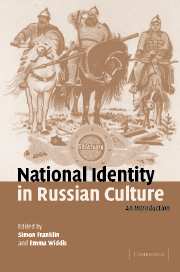Book contents
- Frontmatter
- Contents
- List of illustrations
- Notes on contributors
- Preface
- Note on the transliteration of Russian
- Map: The growth and contraction of Russia and its empire
- 1 ‘All the Russias …’?
- SECTION I IDENTITIES IN TIME AND SPACE
- SECTION II CONTRASTIVE IDENTITIES: ‘US’ AND ‘THEM’
- SECTION III ‘ESSENTIAL’ IDENTITIES
- SECTION IV SYMBOLS OF IDENTITY
- Afterword
- Notes
- Selected further reading in English
- Index
SECTION II - CONTRASTIVE IDENTITIES: ‘US’ AND ‘THEM’
Published online by Cambridge University Press: 04 May 2010
- Frontmatter
- Contents
- List of illustrations
- Notes on contributors
- Preface
- Note on the transliteration of Russian
- Map: The growth and contraction of Russia and its empire
- 1 ‘All the Russias …’?
- SECTION I IDENTITIES IN TIME AND SPACE
- SECTION II CONTRASTIVE IDENTITIES: ‘US’ AND ‘THEM’
- SECTION III ‘ESSENTIAL’ IDENTITIES
- SECTION IV SYMBOLS OF IDENTITY
- Afterword
- Notes
- Selected further reading in English
- Index
Summary
If the chapters in Section 1 began with the questions ‘when are we?’ and ‘where are we?’, then this second section proceeds from the question ‘who are we?’ In other words, the focus moves from ideas about Russia to ideas about Russians: not, of course, about Russians individually, as people, but about Russians collectively, as a people; or indeed about the masses, conceived as the people. Self-definition may be both affirmative and contrastive: we are we because of what we are; and we are we because of what we are not. There is a close relationship, sometimes amounting to interdependency, between representations of the self and representations of ‘the other’.
Chapter 4 starts with a broad survey of Russian ideologies of self, of Russianness, from the eighteenth century onwards. These are official and elite ideologies of the nation, devised and propagated from above: by rulers and their agents, by writers, critics, and intellectuals. Such elites were quite capable of producing radically different constructs of the nation while invoking the imagined ‘people’. But how – if at all – did the ‘people’ themselves conceive or represent Russianness? The second part of the chapter looks at examples from ‘popular’ culture, at emerging forms such as posters and postcards and popular music, to reveal another dimension and dynamic in the production of ideas, or ideals, of Russianness.
- Type
- Chapter
- Information
- National Identity in Russian CultureAn Introduction, pp. 51 - 52Publisher: Cambridge University PressPrint publication year: 2004



